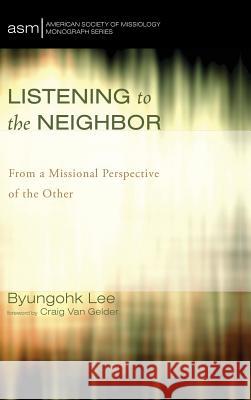Listening to the Neighbor » książka
Listening to the Neighbor
ISBN-13: 9781498219464 / Angielski / Twarda / 2015 / 232 str.
Listening to the Neighbor
ISBN-13: 9781498219464 / Angielski / Twarda / 2015 / 232 str.
(netto: 181,00 VAT: 5%)
Najniższa cena z 30 dni: 187,43
ok. 16-18 dni roboczych.
Darmowa dostawa!
The Trinity can be understood as a social community with members speaking and listening to one another in love, or, as Luther understood the Trinity, as conversation, then God's mission essentially involves in mission-in-dialogue. Byungohk Lee contends the church has to embrace the dialogical dimension in missional terms because the triune God is the subject of mission. The missional church conversation has taken it for granted that local churches should speak and listen to their neighbors. In contrast, for many churches in Asia, including Korea, mission has generally tended to be practiced in a monological, rather than dialogical, manner. The neighbor has not been regarded as a conversational partner of the church, but only as the object for its mission. In Listening to the Neighbor Lee shows that some local churches have participated in God's mission by listening to their neighbors. He argues that listening is not a technique, but a multifaceted learning process in missional terms. The church must nurture its hearts, eyes, and ears in order to listen to the sigh of its neighbors. ""This insightful book from Byungohk Lee is a contribution not only to the PCK, but also to all missional churches in the world. He sharply points out the problem of the PCK and suggests listening to the voice of neighbors as the solution. If you are finding it difficult to develop your congregation, it is time to look at your ministry through Lee's prophetic voice."" --Tae Woong Lee, Pastor, PhD student at Graduate Theological Union Byungohk Lee is a pastor in the Presbyterian Church of Korea and assistant professor at Honam Theological University and Seminary in Korea. He has published articles such as ""Toward a Korean Missional Church: A Dialogue between Missional Theology and Minjung Theology"" (2012), ""Missional Hermeneutic of the Other: A Dialogue between Levinas and Confucianism"" (2013), and ""A Missional Perspective of Moltmann's Trinity for the Suffering World"" (2014).
The Trinity can be understood as a social community with members speaking and listening to one another in love, or, as Luther understood the Trinity, as conversation, then Gods mission essentially involves in mission-in-dialogue. Byungohk Lee contends the church has to embrace the dialogical dimension in missional terms because the triune God is the subject of mission. The missional church conversation has taken it for granted that local churches should speak and listen to their neighbors. In contrast, for many churches in Asia, including Korea, mission has generally tended to be practiced in a monological, rather than dialogical, manner. The neighbor has not been regarded as a conversational partner of the church, but only as the object for its mission. In Listening to the Neighbor Lee shows that some local churches have participated in Gods mission by listening to their neighbors. He argues that listening is not a technique, but a multifaceted learning process in missional terms. The church must nurture its hearts, eyes, and ears in order to listen to the sigh of its neighbors.""This insightful book from Byungohk Lee is a contribution not only to the PCK, but also to all missional churches in the world. He sharply points out the problem of the PCK and suggests listening to the voice of neighbors as the solution. If you are finding it difficult to develop your congregation, it is time to look at your ministry through Lees prophetic voice.""--Tae Woong Lee, Pastor, PhD student at Graduate Theological UnionByungohk Lee is a pastor in the Presbyterian Church of Korea and assistant professor at Honam Theological University and Seminary in Korea. He has published articles such as ""Toward a Korean Missional Church: A Dialogue between Missional Theology and Minjung Theology"" (2012), ""Missional Hermeneutic of the Other: A Dialogue between Levinas and Confucianism"" (2013), and ""A Missional Perspective of Moltmanns Trinity for the Suffering World"" (2014).











